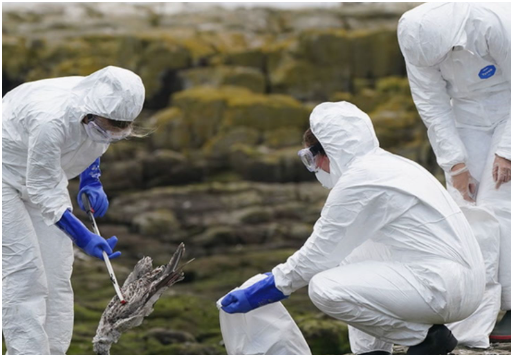WHO Raises Alarm over Global Spread of H5N1 Bird Flu Pandemic
In a stark warning, the World Health Organization (WHO) has sounded the alarm over the alarming proliferation of H5N1 bird flu infections, labeling it as a “global zoonotic animal pandemic.” The gravity of the situation was underscored by WHO’s chief scientist, Jeremy Farrar, who expressed deep concern over the expanding reach of the virus, which has begun infecting various species, including humans.
“This remains I think an enormous concern,” Farrar emphasized during a press briefing in Geneva, highlighting the urgency of the situation.
The current outbreak of bird flu, which originated in 2020, has taken a concerning turn with reports of infections spreading to cows and goats, signaling a disturbing escalation in its transmissibility. Referring to the outbreak as a “global zoonotic animal pandemic,” Farrar stressed the urgency of addressing the evolving threat posed by the virus.
“The great concern of course is that in… infecting ducks and chickens and then increasingly mammals, that virus now evolves and develops the ability to infect humans and then critically the ability to go from human to human,” Farrar cautioned, outlining the potential for catastrophic consequences if left unchecked.
While there is currently no evidence of human-to-human transmission of the influenza A(H5N1) virus, the mortality rate among those infected through contact with animals is alarmingly high. The WHO has recorded 463 deaths out of 889 human cases across 23 countries in the past 15 months, with a mortality rate of approximately 52 percent, underscoring the severity of the threat posed by the virus.
The H5N1 strain, which has ravaged millions of wild birds in recent years, has now crossed species barriers, infecting a range of mammals. Of particular concern is its recent detection in cattle, marking the first instance of the highly pathogenic avian influenza in bovines. Eight U.S. states have reported cases of the virus in a dairy herd, further heightening concerns about its potential to spread to humans.
According to Farrar, the transition of the virus into the mammalian population brings it dangerously close to humans, raising the specter of a potential outbreak among human populations. “This virus is just looking for new, novel hosts,” he warned, urging concerted global efforts to contain its spread and mitigate the risk of a full-blown pandemic.
In addition to global concerns, localized outbreaks of bird flu have been reported in the Alappuzha district of Kerala, India. Confirming cases of H5N1 avian influenza in ducks reared in certain areas, authorities have initiated measures to contain the spread of the virus and safeguard public health.
As the global community grapples with the escalating threat posed by the H5N1 bird flu pandemic, swift and coordinated action is imperative to mitigate its impact and prevent further spread. The WHO, along with national and international health authorities, continues to monitor the situation closely and provide guidance to safeguard public health and mitigate the risk of a potential pandemic.
Addressing the multifaceted challenges posed by the H5N1 bird flu pandemic necessitates a collaborative and coordinated global response. International cooperation, information sharing, and resource mobilization are paramount to effectively containing the spread of the virus and mitigating its impact on human and animal populations alike.
Enhancing surveillance systems and early detection mechanisms is critical to identifying and containing outbreaks before they escalate into full-blown crises. By investing in advanced monitoring technologies and bolstering public health infrastructure, countries can better detect and respond to emerging threats in a timely manner.



